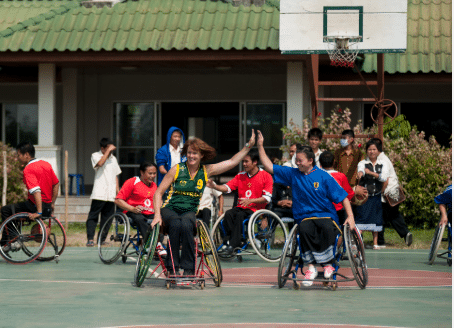Health and Wellness Tips for People with Disabilities
- October 3, 2024
- Jas
As everyone living a long and quiet life of laughter, living with a disability can be challenging. It also offers opportunities to explore new ways to maintain health and wellness. Making everyone’s wellbeing a priority is a key pathway to fulfil your life, regardless of whether you are facing a physical, sensory or mental impairment.
What are the essential tips and strategies to enhance your physical, mental, and emotional health while focusing on activities for the disabled that promote a balanced lifestyle?
Understanding Health and Wellness for People with Disabilities
The absence of illness or disability does not just determine health and wellness. It is also important to enjoy activities in your own way. People with disabilities can improve their mental and physical well-being and quality of life by regularly taking part in a wide range of activities. These activities include not only exercise and sports, but also social interaction and hobbies. Such efforts make for a healthier and more fulfilling day-to-day life.
Physical Health: Staying Active
Exercise is essential for everyone, including people living with a disability. Regular physical activity helps the body to move more smoothly, builds muscle strength, and improves cardiovascular health.
Here are some tips on how to incorporate exercise into your daily routine.
1. Look for sports adapted to your disability: Many communities have sports programmes for people with disabilities. Examples include wheelchair basketball, adaptive yoga and swimming will not only keep you fit, but you may also make new social connections.
2.Incorporate exercise into your daily routine: Simple exercises such as stretching, walking or even chair exercises will make an impact on a healthy body. Aim to get thrity minutes of exercise on most days of the week.
3. Utilise Technology: There are apps and online guided workout videos to stay motivated and engaged especially for people with disabilities.
Mental Health: Dealing with Depression and Anxiety
Mental health is as important as physical health. Difficulties can make you feel alone or depressed, especially for those living with a disability.
Here are some ways to support your mental well-being.
1. Seek Support: Connecting with others who understand your experiences can be incredibly beneficial. Joining a support group, whether in person or online, can help you provide a safe space to share your feelings and learn how to cope.
2. Practice Mindfulness and Relaxation: Incorporating meditation, deep breathing and mindfulness can help relieve stress and anxiety of your depression disability.
3. Engage in Creative Activities: Art, music, and writing are powerful ways to express your feelings, uplifting an individual’s mood and provide a sense of achievement.
Nutrition: Eating for Wellness
A balanced diet plays a crucial role in overall health. People with disabilities can enhance energy levels and improve their cheerful mood when maintaining proper nutrition.
Here are some tips for healthy eating.
1. Plan a Balanced Diet: Focus on preparing a variety of fruits, vegetables, whole grains, and lean proteins into your diet. Meal planning will make it easier to ensure nutritious options are readily available.
2. Stay Hydrated: Drinking enough water is essential for everyone. Proper hydration can improve concentration, energy levels, and carry out your daily activities more smoothly.
3. Consultation with an expert: If you have special dietary requirements or restrictions, it is advisable to consult a nutritionist. Get advice that suits you and help you maintain a healthy diet.
Social Connections: Building a Supportive Network
Social interactions are vital for emotional health. Building supportive relationships with one another can help overcome feelings of loneliness and isolation.
Here are some ways to deepen your connections with others.
1. Join Community Groups: Look for local organizations that focus on activities for people with disabilities. Attending events, workshops, and social events is a great way to meet new people and expand your connections.
2. Volunteer: Getting involved in community activities can be rewarding and give you a sense of achievement. Many organisations welcome volunteers with disabilities, allowing you to contribute while connecting with others.
3. Get in Touch with Online Platforms: Social media and online forums can be excellent platforms for connecting with others who are going through similar experiences to you. Engaging in discussions and sharing experiences, you are less likely to feel alone.
Getting Support:
If you need more support, exploring options like in-home care services is a positive step. These services can help with daily living and provide support to help you continue to live independently. If you live in Melbourne, reach out to NDIS Provider Melbourne to get the right support for your situation.
Conclusion
Sometimes you may face many challenges living with a disability, but at the same time, it is an opportunity to find new strengths.
You can make the most of every day by focusing on your physical health, mental well-being, a balanced diet, and social connections. Do not hesitate to ask for support if you need help, and find activities you enjoy that suit you. If you need exceptional disability care at home, contact Endless Home Health is there for you.
If you’re in South East Melbourne and living in the Dandenong area, our NDIS provider Dandenong team is ready to help. Our Dandenong home care team has been serving in the area for over 10 years helping the Community South East Melbourne.You are never alone in this journey towards health and happiness. Take one step at a time and move forward in your own way!



